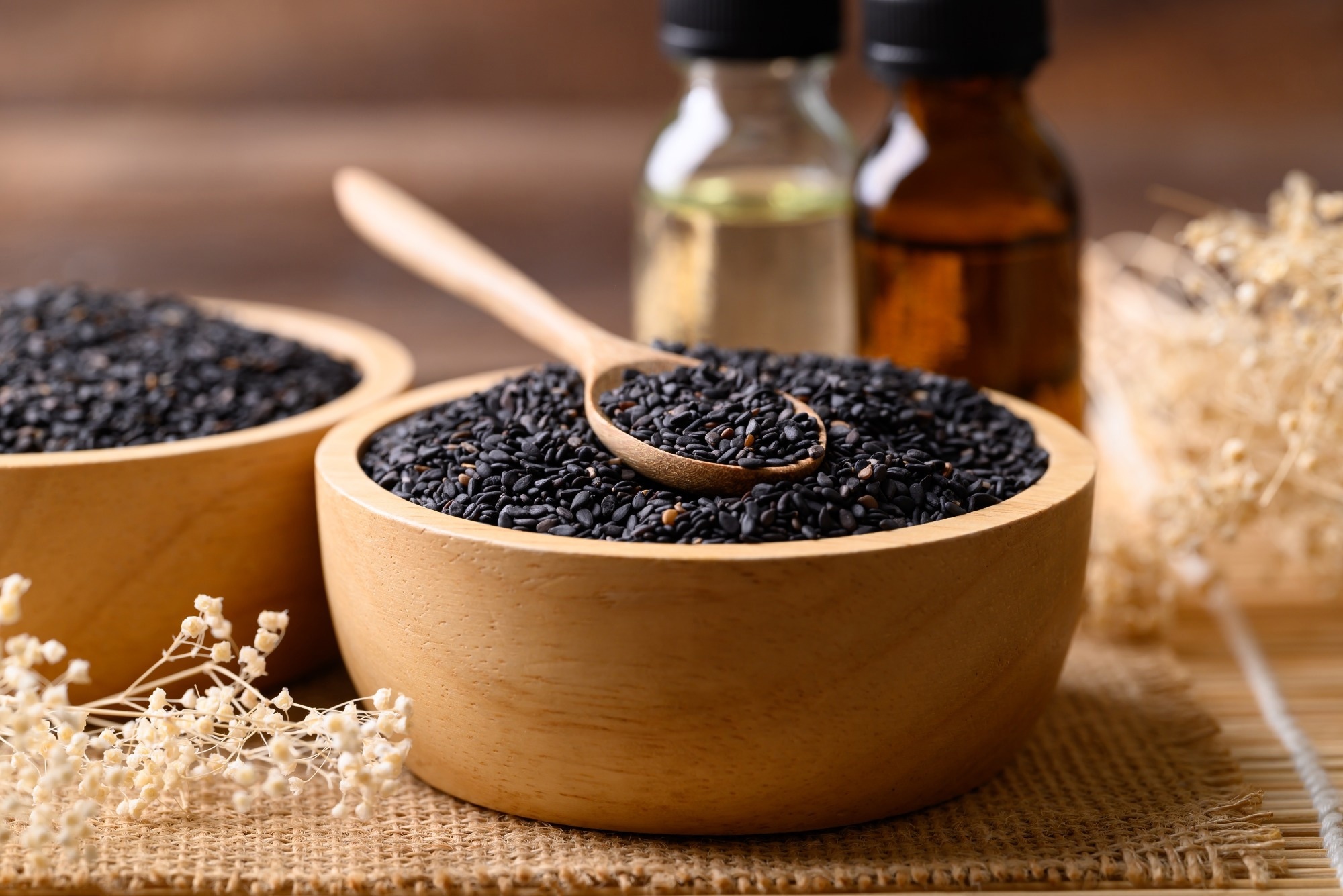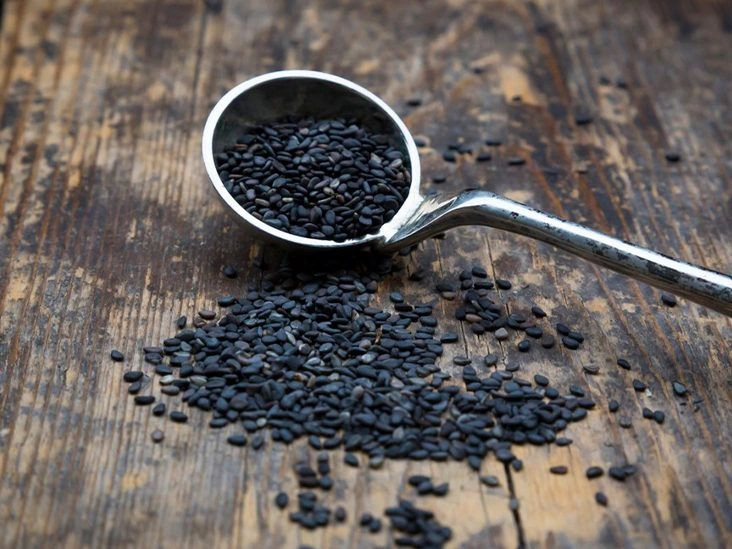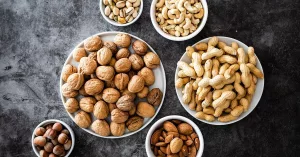Black sesame seeds are tiny, flat, oily kernels that develop inside the pods of the Sesamum indicum plant, a crop cultivated for millennia.
Sesame seeds come in several hues, including black, brown, tan, gray, gold, and white.
Black sesame seeds are mainly produced in Asia, though their popularity is rapidly spreading worldwide.
This growing interest may stem from the notion that black sesame seeds are especially healthful, but you might wonder whether that claim holds up.
This piece outlines the nutritional profile of black sesame seeds and explains how they may support overall well-being.

Black sesame seed nutrition
Black sesame seeds offer a host of nutrients. A 2-tablespoon (14-gram) serving of black sesame seeds provides:
- Calories: 100
- Protein: 3 grams
- Fat: 9 grams
- Carbohydrates: 4 grams
- Fiber: 2 grams
- Calcium: 18% of the Daily Value (DV)
- Magnesium: 16% of the DV
- Phosphorus: 11% of the DV
- Copper: 83% of the DV
- Manganese: 22% of the DV
- Iron: 15% of the DV
- Zinc: 9% of the DV
- Saturated Fat: 1 gram
- Monounsaturated Fat: 3 grams
- Polyunsaturated Fat: 4 grams
Black sesame seeds are particularly high in both macrominerals and trace minerals. Trace minerals are needed in very small amounts, while macrominerals are required in larger quantities.
Higher consumption of macrominerals such as calcium and magnesium is linked to better cardiovascular risk factors, especially lower blood pressure.
Certain trace minerals in black sesame seeds — notably iron, copper, and manganese — are essential for metabolic regulation, cellular function, immune support, and oxygen transport throughout the body, among other roles.
Since sesame seeds are more than half oil by weight, they also supply healthy monounsaturated and polyunsaturated fats.
Current evidence indicates that swapping foods high in saturated fats for those rich in unsaturated fats may reduce heart disease risk.
SUMMARYBlack sesame seeds provide key macrominerals and trace minerals, plus heart-healthy fats that may help reduce cardiovascular risk.
Regular vs. black sesame seeds
Many people believe that darker sesame seeds, including black ones, are unhulled (the outer hull left intact), while pure white sesame seeds have had their hulls removed.
This is largely accurate, although some unhulled seeds can appear white, tan, or off-white, making them hard to tell apart from hulled seeds. Checking the product label is the best way to confirm whether they are hulled or unhulled.
Unhulled sesame seeds usually have a firmer crunch and a more pronounced taste compared with the softer, milder flavor of hulled white sesame seeds.
Beyond texture and flavor, hulled and unhulled seeds can differ notably in nutrient content.
The table below shows key differences between 1 tablespoon (9 grams) of unhulled and hulled sesame seeds (, ):
Unhulled Hulled
Calcium 88 mg 5 mg
Iron 1 mg 0.5 mg
Potassium 42 mg 30 mg
Copper 0.37 mg 0.11 mg
Manganese 0.22 mg 0.12 mg
Certain beneficial phytochemicals in sesame, such as lignans, concentrate in the outer hull; therefore, unhulled black sesame seeds generally contain more lignans than hulled white seeds.
Emerging work also indicates that white and black sesame varieties may differ in their phytochemical profiles, amino acid content, and antioxidant levels. Black sesame seeds seem to contain higher amounts of lignans and some advantageous unsaturated fatty acids.
However, only a limited number of studies have investigated these differences, so additional research is needed to draw firm conclusions.
SUMMARYCompared with hulled white sesame seeds, unhulled black sesame seeds are richer in nutrients and have a more intense flavor and crunch.
Health benefits of sesame seeds
Black sesame seeds are packed with nutrients that support health, and consuming them regularly may offer specific advantages.
One reason black sesame seeds may be helpful is their potential to reduce oxidative stress, especially in people with chronic illnesses.
In an 8-week mouse study, daily doses of 0.45–0.9 mL of black sesame extract per pound (1–2 mL per kg) of body weight improved insulin sensitivity, lowered liver oxidative stress, and seemed to protect against weight gain.
Some human studies have also suggested that black sesame seeds may reduce oxidative stress.
For example, a trial with 30 participants found that taking 2.5 grams of black sesame seed capsules per day for 4 weeks significantly lowered malondialdehyde (MDA), a common marker of oxidative stress.
Nevertheless, human research is still limited, and further studies are required.
Additionally, some trials used concentrated sesame extracts, so whole black sesame seeds might not produce the same effects. More randomized controlled trials in humans are necessary.
Rich in antioxidants
Antioxidants help prevent or slow cellular damage in the body.
One type of harm antioxidants protect against is oxidative stress. Persistent oxidative stress may contribute to chronic conditions such as diabetes, cardiovascular disease, and cancer.
Certain foods are especially rich in antioxidants — fruits, vegetables, nuts, and whole grains rank among the best sources.
All sesame seeds contain antioxidants and beneficial plant compounds, but black sesame seeds seem to be an especially potent source.
Sprouted black sesame seeds may hold even higher levels of some antioxidants compared with unsprouted seeds.
May improve blood pressure
A small trial involving 30 adults showed that taking a capsule with 2.5 grams of black sesame seed meal daily for 4 weeks significantly lowered systolic blood pressure (the upper value), while a placebo group saw no change.
Additionally, a systematic review examining sesame seeds’ effects on blood pressure reported that five of seven clinical trials found significant blood pressure improvements.
Still, the reviewers noted that higher-quality studies are necessary to confirm these preliminary results.
May have anticancer properties
In recent years, sesame seeds have been studied for potential anticancer effects.
Two compounds in black sesame — sesamol and sesamin — are thought to play roles in these properties.
Sesamol has shown anticancer activity in multiple animal and laboratory studies.
These experiments have documented its ability to counteract oxidative stress and influence various stages of cell growth and signaling pathways — processes involved in cancer development.
Sesamin appears to act similarly, promoting the programmed death of cancer cells (apoptosis) and the removal of damaged cells (autophagy).
Human trials, and studies using whole black sesame seeds rather than concentrated extracts, are still lacking. Consequently, the effect of consuming black sesame seeds on cancer risk remains unclear.
May promote healthy hair and skin
Sesame oil is commonly used in hair and skin products like soaps, shampoos, and moisturizers. This raises the question of whether consuming black sesame seeds benefits hair and skin as well.
While direct studies on dietary black sesame’s effects on hair and skin are few, the seeds contain nutrients known to support healthy hair and skin.
These include:
- iron
- zinc
- fatty acids
- antioxidants
Other research has examined topical sesame oil. For instance, a 2011 study found sesame oil could block up to 30% of harmful ultraviolet (UV) rays. UV exposure not only causes sunburn but also contributes to wrinkles, premature skin aging, and skin cancer.
Another recent trial of 40 emergency-room patients with limb injuries discovered that massaging the injured area with sesame oil reduced pain significantly.
However, neither study specifically used oil derived from black sesame seeds.
SUMMARYRegular intake of black sesame seeds may reduce oxidative stress, help lower blood pressure, and supply antioxidants and phytochemicals that could combat cancer. Still, more human research is needed.
How to use black sesame seeds
Black sesame seeds are available online and at most supermarkets.
They are very adaptable in the kitchen. Sprinkle them over salads, vegetables, and rice or noodle dishes. Use them in baked goods, or as a crunchy crust for fish.
Black sesame seeds can be blended into milk or made into tahini, and black sesame oil can be used like other culinary oils.
Black sesame extract is also sold as an oil or in capsule form. There are no clear dosage guidelines for black sesame extract, so consult your healthcare provider before using supplements.
Although generally safe for most people, some individuals may have an allergic reaction to sesame. Exercise caution if you’re trying black sesame seeds for the first time.
SUMMARYWhole black sesame seeds are versatile in cooking, and black sesame extracts are available as oils or supplements.
The bottom line
Black sesame is a nutrient-dense oilseed from the Sesamum indicum plant with a long history of cultivation.
Some evidence indicates black sesame seeds can help lower blood pressure and reduce oxidative stress in the body.
However, more research is necessary to determine the effective amounts and forms needed to produce these effects.
Nonetheless, black sesame seeds are safe for most people who do not have a sesame allergy and are a tasty addition to many dishes.
Shop for black sesame seeds online.

























Leave a Reply
You must be logged in to post a comment.